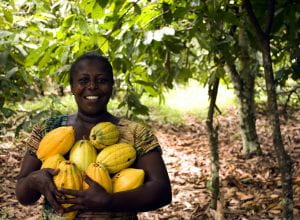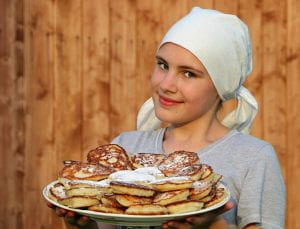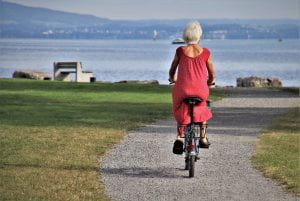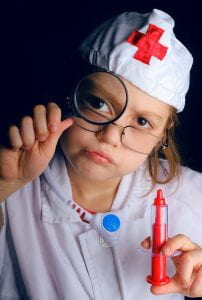So often in family history, it is the women who are hard to trace.
- What types of occupations did your female ancestors and relatives have? Did they work in the same jobs before and after marriage?
- Were women in your family employed in the same occupation over several generations? What socio/economic factors contributed to this?
- Were any of the single/widowed females in your family the sole breadwinners? Did they own or operate a business?
- What resources have you found useful for researching women in the workforce? Have you found any women with interesting occupations?
Many of our answers covered more than one question this week, so I am just going to write under one heading
Working women in your family
There were no doubt some @BadBridget among the immigrants/emigrants but equally many worked hard to set themselves up in independence. Also they were often the leaders in Irish migration – unlike other countries!
Margaret: quite a few of mine signed the 1893 Suffrage Petition including my grandma and great grandma
Lots of nuns in our Catholic families most of whom became teachers, was a respectable alternative to marriage, one unmarried sister usually stayed at home to care for elderly parents until death
Nuns had occupations when married women had to stay home. I guess that was the choice.
Dara found ‘Histories’ about the convent that described a Nun’s character and life in great detail. Lovely find
Margaret R said you have just reminded me we have some great Nun’s records in our family. One died basically of working too hard caring for those suffering from influenza in 1918. @iwikiwichick and I found her grave.
Sharn’s great aunt test flew spitfires in Hampshire during WW2
Paula’s great grandmother worked in the jute mills in Dundee. Dundee and particularly Lochee at that time was very much dominated by females. As they could earn more it was sometimes the men who stayed at home.
#ANZAncestryTime sure helps you remember things. I just remembered my great grandmother worked in a labour exchange. She ran a separate room for ladies. Plenty of ads in @PapersPastNZ #ANZAncestryTime pic.twitter.com/Dd2bJjGJF5
— fran kitto (@travelgenee) February 9, 2021
- Famberry’s great grandmother had to work farmland to look after 3 children and 2 adopted children, after her husband died. Survived by selling parts of the land. (An acre for £4).
- Jane: Eliza operated the lighthouse with her husband from 1884 to 1886 when he died unexpectedly and then on her own to 1887 when she died age 59. She had had a hard life – grew up in a Buckinghamshire workhouse after effectively being orphaned … Mother died a year after her father was transported to Australia
- Frances: One of my 3x great-grandmothers has been referred to as a baby farmer! She has taken in an illegitimate child and was paid for her upkeep. But there’s no evidence of baby farming, just the one little girl rebelhand.wordpress.com/2015/01/18/a-c…
- KLor: my grandmother had such beautiful skin she was hired as a model to sell soap. Pre-TV, this involved sitting on a chair on a conveyor belt as people looked at her through the shop window.
- Lena: In Germany there was the female teacher celibacy from 1880 to 1919. Teachers were public officials. When they married they lost their entitlement for their pension.
- Fran: most of the UK census data for my female ancestors have no roles before or after marriage so it is very had to say. For the generation before me, my mother and aunts kept working in sewing factories after marriage. I always had the latest bathers.
- Sue A: Women’s work is under recorded on UK censuses before and after marriage. Earlier census more likely to record women’s occupation, later ones enumerators were instructed not to. Lots of female ag labs vanished as a result
- Mr Cassmob’s ancestor was in the news and police gazettes for being drunk and disorderly. She was a Famine Orphan so perhaps a form of PTSD?
- Sylvia: Textile weavers in 19thC Lancashire cotton mills. My mother was able to break away & became a teacher.
- Pauleen: I have single cousins who were in the army or similar, but not married women. Mum worked as a volunteer aircraft spotter. cassmobfamilyhistory.com/2020/04/25/vol…
- Sharn: My g g g grandmother a free Irish woman married to a convict ran a brothel in Phillip Street in Sydney. She was frequently arrested and in the news
- Paula: In my family tree widows seemed to marry again fairly quickly. In some cases gaining a few extra children to look after in the process.
- Sue: My great grandfather died in Nov 1914, one month after his son was born. His wife then worked the farm with her chn for many years, then moved between her three girls houses in Longford and Hobart

Carmel: a widowed gt gt grandmother migrated with 3 young sons and established a farm, the purchase of the land was in her name.
Karen: My great grandmother’s husband deserted her and left her to look after several children on her own. I don’t know how she survived. Bit of a mystery.
ANZ: Yes so many women had a hard time when their husbands disappeared – one of mine waited 20 years before declaring him dead and taking over the property
Pauleen: My 2xgreat grandmother Bridget McSharry nee Furlong worked as a boarding house keeper after her husband died or disappeared. Financially challenging times. My great grandmother Emily Melvin supported her husband after his bankruptcy and jail.
Helen: Running a ‘house of ill fame’ (a most interesting woman to research!)
Dara: Wow! One of my great-grandfather’s cousins – all the daughters were on the game. very sad, all due to poverty, left me with very many ‘DNA cousins’ who don’t know their paternal line.
- Sharn: My great grandmother’s husband ran off with a bar maid. She took over their green grocery store in the Valley, Brisbane. She claimed to be the first female fruiterer in Brisbane.
- Jennifer: I know of one single breadwinner. My gg gfather’s sister was school mistress in Scotland, following the tradition of position being filled by family members. First her grandfather, then her father, followed by 2 brothers. She took over when a brother died
- Pauleen: My 3xgreat g’mother Catherine Happ inherited her family’s hundreds year old Bavarian inn. Of course her husband then became the official innkeeper.
- Margaret R: When my grandmother was widowed with 6 children, some still preschool, it seemed mainly they survived by using the bit of land they had for a cow they milked, and growing lots of vegetables
- Dara: On my Mam’s side, they continued with ‘the shop’ after their husband died. My grandfather, who knew he had a weak heart, reopened a shop with my Granny before he died, so she would have an income afterwards
- Hilary: my gt grandfather’s brother died before his wife who I believe ran a fruit and vegetable shop looking at the records it was probably her business rather than his
- Shauna: Sadly a number of my female ancestors were widowed and they usually fell on hard times or remarried quickly. Mostly my families were poor so no businesses to run.
- Sharn: My 3rd great aunt was widowed when she had a 4 year old son. She worked first as a tailoress and later owned and operated a green grocery store in Ipswich Suffolk. Her sister my ancestor also widowed came to Australia
- Sharn: My Scottish females all worked in the cotton industry in Glasgow because that was what was near the coal mines their husbands worked in
- Dara: My great-grandmother was a musician, after her first husband died. She played piano and violin at the silent movies. Initially she probably had to take it up to pay for their keep, but there is certainly less pleasant work. Unusually, there is a census record that she worked outside the home after (2nd) marriage.
- Famberry: Mainly nursing but one relative worked in a cake/tea shop, which explains my love of cakes.

Shauna: My great grandmother was a deaconess in her church but she was only referred to as Mrs Thomas Price in the annual reports
Sue: One of my great great great grandmothers had a boarding lodge in Evandale and there was mention of a murder there in 1861 nla.gov.au/nla.news-artic…
Shauna: When I joined the Queensland Public Service in March 1974 men were still moaning about how women were now getting equal pay. Somehow they thought I should have been in the typing pool.
Helen: Australian women in the Commonwealth Public Service had to give up their jobs once they married until 1966! Outrageous!
- Margaret B: It was my generation! My cousin retired from teaching at 55. Then she went back as a relief teacher. But she had plenty to occupy herself. I retired at 50 and have never been busier. Just don’t get paid for my work.
- Paula: My ancestors took whatever jobs they could find. Sometimes that might involve leaving home. It’s only recent generations who have had choices I think
- Shauna: My mother worked at Freer’s Chips (not far from where we lived) Fridays were wonderful when she came home with a mega big bag of chips that somehow never made it into packets
- Jill: My mother worked in the Post Office in the country as a telephonist. When she moved to Sydney she worked in the GPO.
- Pauleen: Working as dressmakers was common between female siblings. Occupations were frequently determined by the family’s circumstances eg if they had a farm or a business. With large families extra income was helpful. Education beyond primary school a luxury.
- Shauna: Coming from a long line of miners, jobs were mostly to do with the mines, tin in Cornwall and coal in the Midlands. It is easy to see why Australia was attractive to emigrants
- Carmel: Once my grandmother’s husband died in the 1919 flu she had to give up the farm and work in casual jobs to support her 6 children, milking a cow and had the young boys sell the milk, later in life always worked a housekeeper for Catholic priests
- Daniel: I’d say Farmer’s Wife is all I had seen… I had a few domestic servants, some kept it on after they married but farmer’s wife is primarily what I’d seen.
- Jane: Mainly ‘unpaid domestic duties’ or equivalent after marriage … otherwise, lace makers, servants …
- Shauna: I think farmer’s wives probably did everything – worked the farm, looked after the kids, did the housework and everything else – a hard life then as now – my farmer went insolvent after his wife died and the kids were split up
- Margaret: My cousins worked as nurses, teachers and dental nurses. One served in WWII. Those that had children gave up working, those who didn’t worked until they retired.
- Dara: A significant number of my mother’s female ancestors had a grocery shop. Of course, they were always labeled the ‘wife of a XX’ in official records
Sue: One of my Irish convict ancestors said she was a nursemaid on her convict records but naturally didn’t follow that once she was here in Tasmania
Pauleen: I’ve seen some early Irish immigrants get jobs as nursemaids, presumably because of being older children in big families – don’t imagine all had been employed in the “big houses” before they left.
Margaret R: Have just remembered a very sad tale about a 2X great-aunt who was ‘licensed out’ from a children’s home when her father deserted, and she was horribly abused. Court case was in Trove. As a child she would have been doing domestic work.
Jennifer: My grandmother worked in a factory until she was 70. They gave her a retirement send off when she reached retirement age. She went back to work next day saying she had no intention of retiring.

- ANZ: I’m not sure what my ancestors did in the 18th and 19th centuries. Bur Elizabeth Phipps was a Cotton Spinner in London prior to transportation in 1813.
- Helen: Unfortunately one of my female ancestors has all sorts of records associated with her that list dressmaker/laundress (police record, industrial school records), so I do know
- Karen: Domestic servants and later homemakers, mostly. Some farmers’ wives. My great grandmother’s sister was a printmaker/artist’s model. I think their mother had a small shop but still trying to find out about that.
- Sharn: My great great grandmother gave up nursing to accompany her wayward tenor singing husband on piano. I don’t imagine her parents were pleased
- Carmel: several were farmers’ wives but would only have been ready for this 365 day a year role if they had grown up on a farm themselves. My mother worked in a small town shop before becoming a farmer’s wife.
- ANZ: I’ve done a little research on a relative who was a nurse, did private nursing in Italy before the First World War, then came back to work in England. She’s a fascinating character. Involved in London theatre as well
- Margaret R: My Aunty was a nurse, but I have found her very hard to research. In electoral rolls she is mostly listed as spinster, only occasionally as a nurse!
- Pauleen: There’s similarity between my women ancestors and relatives: railway gatekeepers , station Mistresses, dressmakers or embroidery/lacemaking, farmer’s daughters and shop assistants in family business
- Jennifer: Most of my female ancestors were domestic servants. My gg grandmother took in washing, even though I’m sure she had enough of her own. She had 11 children at the time! Her husband described her to his family as a “good hardworking wife”
- Fran: Servants, factory workers, dressmaker, drapers apprentice, Ag lab. Nothing that exciting except for Mabel Dawson who worked on the stage in shows. Played instruments.
- Sue: Know mum worked as a clerical assistant sending out Hydro accounts before marriage, then did lots of volunteer work with the Girl Guides

Resources to use
- Wonderful to visit museums and see just how some occupations were carried out and the conditions they worked under.
- Paula visited the Verdant Works museum and seeing the type of work her great granny would have done in the jute factories and the life she would have lead was really fascinating
- I have found odd things in the @ArchivesNZ & @PapersPastNZ by just searching a name. Eg teachers, nurses and public servants.
- When it comes to women and work in our families we have to be very lateral in our searching – there are opportunities out there, but they’re not just the routine paths necessarily.
- Margaret has a book she won about NZ Colonial Businesswomen. Written by a NZer now elsewhere.
- Maggie mentioned a fascinating insight into female businessowners is Catherine Bishop’s Women Mean Business: Colonial businesswomen in New Zealand otago.ac.nz/press/books/ot…
- Sharn has only one book about female ancestors’ occupations and that is Margaret Ward’s book Female Occupations
- Similar answers to last week: academic articles, published diaries & letters (both personal and to papers) often give an interesting insight into what life was like. Insights into more recent women’s lives from oral history collections. My ancestors were dull!
- Karen recommends Trove, Ancestry.com, NSW State Archives, Local libraries, State libraries, National Trust properties. Most interesting is probably artist’s model and printmaker.
- Sharn found this article written by The Social Historian to be interesting thesocialhistorian.com/womens-occupat…
- Sue mentioned some convict employment records are now available online in the Tasmanian Names Index
Public Record Office Victoria and Her Place Museum present the online talk “Women’s history beyond stereotypes” as part of International Women’s Day 2021. Friday 5 March 2pm. Tickets are free. Info & bookings: https://t.co/8TNbJcIIma #ChooseToChallenge #IWD2021 @HerPlaceMuseum pic.twitter.com/1IeU0UEJTT
— PRO Victoria (@PRO_Vic) February 9, 2021
Carmel mentioned there is an excellent collection of letters by female emigrants to Aust, NZ in the AJCP via Trove where many of them describe their working conditions. Letterbooks of the Female Middle Class Emigration Society, 1862 – 1882 nla.gov.au/nla.obj-77025- Tara mentioned one of the general resources I found on life in Dublin – you might have seen it before Dublin 1756-1847 logainm.ie/Eolas/Data/IHT…
- Fran: Many roles talked about today have women doing jobs that “don’t count”. If you are interested in following this up a place to start is “If Women Counted” by Marilyn Warning. It’s regarded as the “founding document” of the discipline of feminist economics.
- Another from Carmel: “If women counted” by Marilyn Waring available on Archive.org
- Tara: the @BadBridget podcast (worth listening to) acknowledges that and the role of women’s remittances in assisting migration of other family members and maintaining/supporting remaining family noted.
- Pauleen: Electoral rolls after franchise, news stories about their community activities, marriage certificates, parish registers, oral history, heirlooms (sewing machine), Post Office directories, books about type of work and conditions
- Maggie: Margaret Ward’s book, Female Occupations: Women’s Employment 1850-1950, is a useful resource for understanding various jobs women undertook to earn a living
- Shauna: government gazettes are a useful resources for tracing female teachers or anyone working in a government position. Each Australian state published their own and digitised copies can be found online
- Helen: I downloaded a dataset of probate records from @PRO_Vic, extracted subset of records for occupation ‘farmer’, then analysed ratio of female to male (no surprises). I like seeing the big picture. Hence earlier question
- Fran: Many mothers and grandmothers served in WW2 in both the army and the RAAF – many records can be found at the National Archives of Australia
A3.2 I found this interesting “letter to the editor” about being a domestic servant. Offers insights into what was required of them. https://t.co/hTb9avpoLr (extract below) #ANZAncestryTime pic.twitter.com/j9lzj4CJeq
— Pauleen Cass (@cassmob) February 9, 2021
- Many people mentioned Visible Farmer website https://www.visiblefarmer.com/
- Maggie: I’ve come across lots of advertisements in newspapers for women offering services, dressmaking, laundering, etc. Great way to find out how they earned a living
- Sue: Maybe we need to look more carefully at marriage certificates and census/electoral roll to see if the women are more than spinster or full age or minor age and add to their profiles on Ancestry or our trees
- Margaret B: When the family were in Scotland there were a few servants both domestic and agricultural according to the Census. Some were very young when they left home. And some were still working when quite old.
- Helen: On my GGG grandmother’s probate record she is described as a farmer, I think because farm land was owned in her name. Whether she was involved with farming I don’t know. Her death cert said ‘spinster’ but the probate told another story.
- Fran: I do have a few female head of households in UK & Wales census data however they do not seem to have different roles than before. Might be the husbands are just away.
- Sue: University of Sydney have a research group about women and work sydney.edu.au/business/our-r…
- Sue: Information from International Labour Organization about women and work, more what is happening now but looks at all countries ilo.org/infostories/en…
- Sue: Some interesting reading about history of women and work in the US but would be similar to industrialised nations around the world brookings.edu/essay/the-hist…
- Helen: For some nurses in the family I’ve found evidence of their having taken nursing exams in @TroveAustralia

Some great comments and conversations
Helen: Recently did a family history project for a friend and I was DETERMINED to fill in the considerable blanks for the women (and I always search for evidence for babies born and died between censuses in UK research, which so many leave out in Ancestry trees).
Pauleen: Isn’t it interesting how one person’s comments triggers off memories or thoughts of our own families.
Jennifer: Sure is. I’ve been thinking about all my frustrations with bank managers over the years.
Pauleen: You can readily see how women whose husbands weren’t as egalitarian would have potential problems especially if they were divorced or deserted, even today.
Jennifer: I experienced it up until recently as a business owner partnered with my husband. In the end I did all the bank negotiations. Had to convince the bank that, yes I may be female, but yes I do know what I’m talking about. as I’d done all financials for 3 decades
Tara: Very struck by today’s discussion that ANZ women seemed to have greater public knowledge/acknowledgement of their economic role than their European sisters.
Shauna: I’ve done a lot of reading on baby farmers and backyard abortionists – that reveals just how desperate some women were and how other women took advantage/helped them out
Fran: When I think about owning a business many of my male ancestors were watchmakers and lived above the shop. Perhaps the family (wives & daughters) did plenty of unpaid work serving in the shop. So hard to know unless someone wrote a journal or perhaps a letter.
Tara: really difficult to tell in Ireland, often marriage records removed any ref to woman’s occupation (respectability), knowledge after marriage often oral. English ancestors, only one had known occupation after marriage: Inn keeper.
Pauleen: Similar here Tara. I love that my Irish 2xgreat g’mother from Co Clare put “farmer” on the electoral roll here. Fair enough too – she’d helped to clear the land and establish the farm while he worked on the railways.
Tara: Some of the oral histories I collected for my thesis last year recorded the sheer amount of farm work their mother’s did. It would be more accurate to describe these women as farmers in their own right. Often father absent (cattle dealer, champion ploughman)
Sharn: When my great grandmother married Tara they lived on a banana farm. She always called herself a farmer
Tara: I wonder what the difference was Sharn – from the records I’ve seen, those oral histories, and my own family, that attitude wouldn’t have been common in Ireland. Perhaps more liberated from Victorian notions of “respectability”
Karen: One of my late grandfathers was proud that his wife did not have to work. He felt women going to work was a problem. Many women in the 1950s automatically lost their jobs when they became pregnant. Attitudes have changed.
Pauleen: Back in the day men sometimes saw it as a negative reflection on their earning capacity if their wives had to go out to work. Potential study and careers were sacrificed.
Pauleen: Married or single or widowed or deserted, paid employment or not, they were almost always involved in volunteer community or church activities as well as home dressmaking/knitting etc. Their hands were never idle. And the responsibility for large families
Paula: My female ancestors were in poorly paid work. Jute workers , bleachfield workers (I didn’t know what that was), pottery worker, farm labourer, domestic servant. After marriage it was all about having and looking after children. Some big families.
Pauleen: I imagine they’d have suffered some ill health after some of those jobs especially bleachfield workers.
Allie: Based on the Irish linen industry, I -think- a bleachfield worker laid cloth out to bleach in the sun. Some chemicals were involved, particularly later on, but I’m not sure if that was part of the same job. There’s a bleach green in our local folk park nmni.com/our-museums/Ul…
Fran: I think that some times it was the “place” they lived that meant they were employed in the same occupation. They may have moved to places with jobs in the industrial rev. period. Lack of transport meant you worked locations near to where you lived. I assume it depends how poor they are & opportunities available. Have found related families moved over time so having relatives at the new place would help get jobs, contacts for accommodations, etc. Though then the male role is usually dominant.
Readers: How do you find out about the lives of your female ancestors? What occupations have they had?